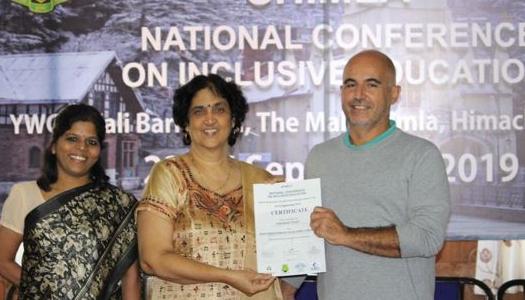Indian National Conference on Inclusion

Frederic Fovet, Associate Professor in the School of Education and Technology, attended the Indian National Conference on Inclusion in Shimla, Himachal Pradesh, on September 23rd-26th. He was presenting a paper on the organizational challenges of scaling up Universal Design for Learning initiatives within the K-12 sector. It is the second time Fovet has attended the National Conference on Inclusion in India though it is the first time the conference is held in Northern India; it changes location every year.
India has embarked on a systemic, nation-wide push towards Inclusive Education in the K-12 sector, following the ratification of The Rights of Persons with Disabilities Act, 2016, which builds on – and pushes boldly beyond - the National Policy for Persons with Disability, 2006 and the Right of Children for Free and Compulsory Education, 2009. There are therefore exciting and timely opportunities for comparative and collaborative research between India and Canada on this topic.
It is particularly refreshing to share research and best practices with Indian colleagues in this field, as they quickly challenge outcomes of the North American literature and seek to adapt these to a local context, as they endeavour to explore sustainability and feasibility of these initiatives and models within the very different demographics India has to address. It reminds us of the limitations of some of the research that has collectively been produced within the North American landscape: it does indeed take for granted small class size, availability of technology, and some PD resources; Indian schools have to work faster, more creatively and cannot count on these variables being present. This does not, however, hinder the enthusiasm currently being demonstrated for Inclusion across India. And we may have a lot to learn from this.
Indian scholars on inclusion are also currently very interested in following the lessons we are drawing after two decades of inclusive legislation in Canada. As we examine challenges, false starts and remaining hurdles, our Indian colleagues are keen to actively dissect these exposes in order to avoid some of the mistakes that were recorded in the North American context. The need to produce a strong scholarship, not just about Inclusion but around the process of management of change that accompanies this drive towards inclusion, is currently at the forefront of concerns within the Indian context.
Fovet has been invited to join the International Advisory Council of the Global Inclusive Education Network (GIEN) as a result of his involvement in the National Conference on Inclusion.